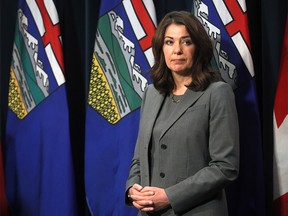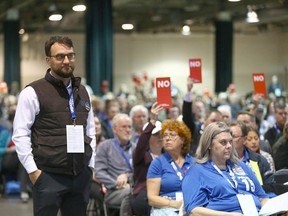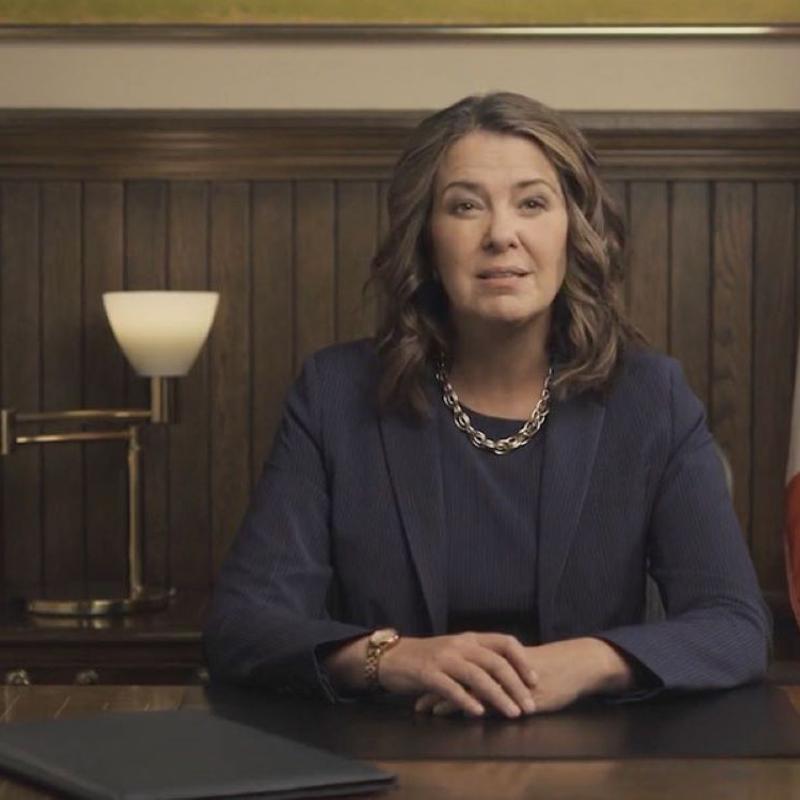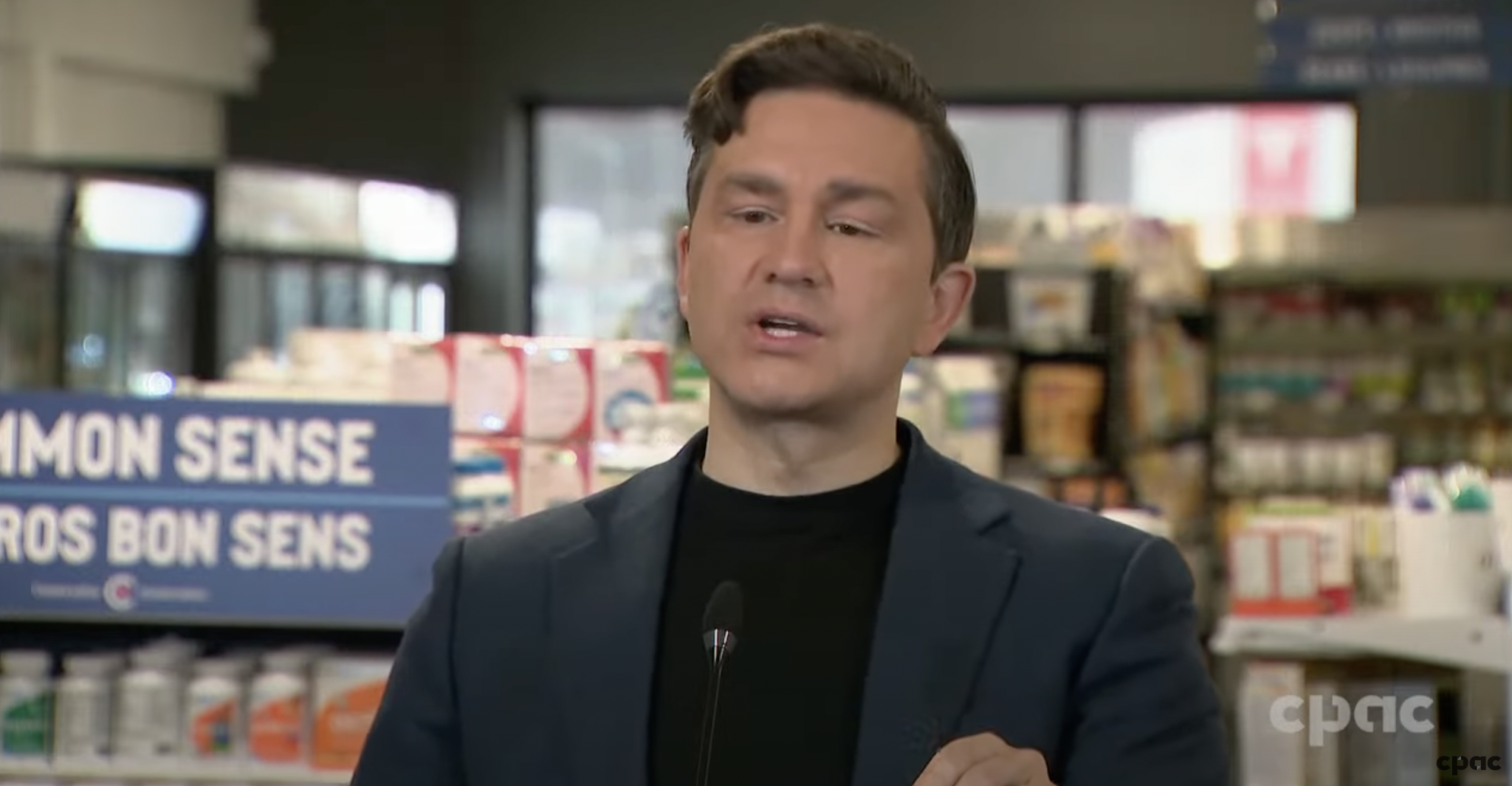By Sean Previl Global News
February 27, 2024

WATCH: Singh brushes off possible pharmacare opt-outs by some provinces

“What happened was provinces had universal health care in some places, and people said, ‘Well, we’re getting our coverage,’ and then people said, ‘Well, why aren’t we getting our coverage,'” he told reporters Monday.
His comments came one day after Alberta Health Minister Adriana LaGrange wrote in an email to Global News that if the federal government pursues a national pharmacare program, the province intends to opt out and would seek a per-capita share of the funding.

2:06 Alberta says it’ll opt-out of national pharmacare deal
A spokesperson from her office said Alberta was not consulted on the national pharmacare plan, “and there are limitations in the initial analysis and assumptions, including start-up investment and administrative costs to implement a cost-sharing model, that were not taken into consideration that add costs for the provinces.”
The spokesperson said the vast majority of Albertans have access to contraceptives through employer or government health care insurance plans.
However, Dr. Rupindeer Toor told Global News not all programs are available to residents and can be patchy and difficult to access.

1:20 NDP’s Singh ‘not surprised’ Alberta intends to opt out of national pharmacare plan
The latest health and medical news emailed to you every Sunday.
The New Democrats said birth control coverage will help millions of women and gender-diverse people.
Singh questioned the move, saying Premier Danielle Smith could face questions if the province moved forward with its decision to opt out.
“I think it will be very difficult for the premier in Alberta to explain to people in Alberta who can’t afford their diabetes medication why they’re turning down an investment that would cover everyone in that province for their insulin and for their medical devices necessary for diabetes,” Singh said.
Diabetes medication is one of two specific categories of drugs that would be covered in the deal, with insulin for Type 1 and Type 2 diabetes, as well as additional diabetes drugs to see full coverage.
The deal also includes coverage for contraceptives similar to British Columbia, which includes birth control pills, IUDs and emergency contraception.
The deal also puts forward a fund to help provinces cover the cost of insulin pumps for diabetes patients, for which the NDP wanted maximum coverage, a source told Global News.

1:57 NDP reaches national pharmacare deal with Liberals. Here’s what it will cover
But Alberta is not the only province voicing concerns, with Quebec also previously having said — before the deal was reached Friday — it would opt out if the option is there.
Asked by reporters if an option to opt out would be included, Singh appeared to sidestep, saying the plan was to negotiate to provide single-payer public funding to make sure people can access medication.
The NDP leader went on to say there are still further steps to come with pharmacare, including discussions on all the medication that will be covered as well as determining how medication can be purchased in bulk.
He was also questioned on why contraceptives and diabetes medications were advocated for, to which Singh said the party had to fight for these drugs to be included, pegging the election of more NDP MPs as what will be needed to get more classes of drugs added.
“If we want to complete the work of pharmacare, the Liberals are not going to do it,” he said.

3:48 Bloc Québécois MP questions whether Quebec can opt out of pharmacare plan
If the federal government moves towards fully implementing national pharmacare, that wider program is expected to cost roughly $40 billion a year in total, the parliamentary budget officer said in a report last fall. The report said the incremental cost to the public sector, including federal and provincial governments, would rise from $11.2 billion in 2024-25 to $13.4 billion in 2027-28.
However, such a program was also estimated to lead to cost savings on drug expenditures of $1.4 billion in 2024-25, with that figure increasing to $2.2 billion by 2027-28.
A source close to the pharmacare talks told the Canadian Press the Liberals made it clear they had about $800 million to spend for an initial program, and over the weekend Finance Minister Chrystia Freeland said the plan would need to be “fiscally responsible.”
— with files from Global News’ David Baxter and Carolyn Kury de Castillo and The Canadian Press
Alberta plays politics and rejects the agreement before any details are known.
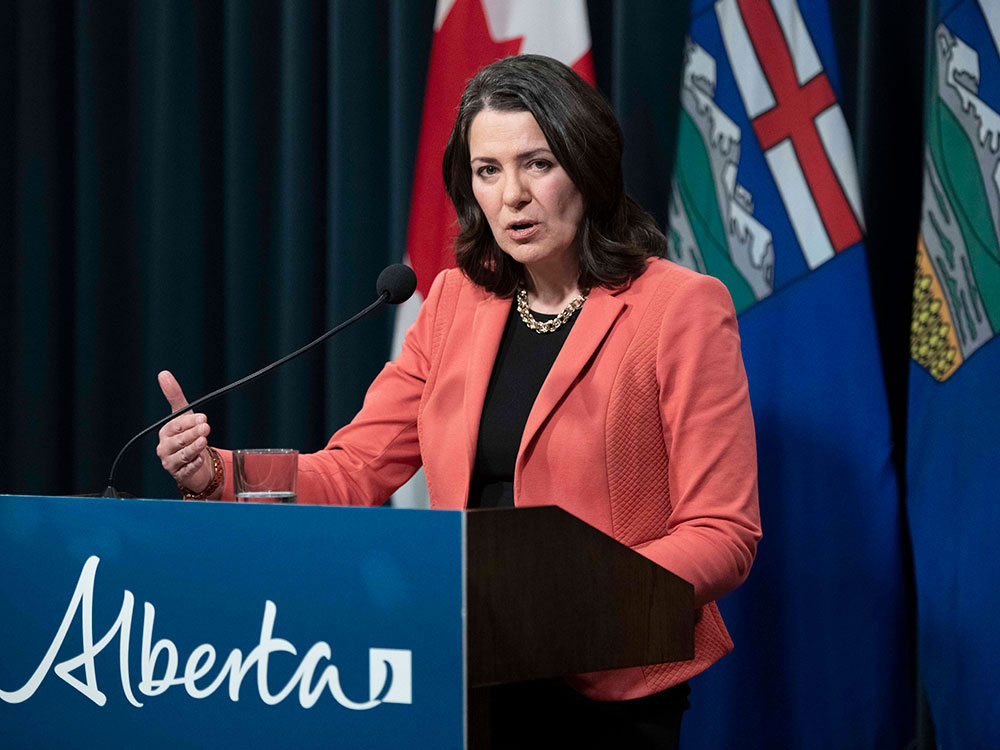
No sooner did the federal Liberal and New Democratic parties say they’d reached a deal on a national pharmacare program, than Alberta’s United Conservative Party government insisted it wanted no part of the plan.
Never mind that the Liberals and NDP said the details of the plan they’ve agreed to will be made public this week.
As Chris Gallaway, director of Alberta’s Friends of Medicare, said in a statement Monday morning, “by pre-empting their decision on pharmacare even before the federal announcement is made, Danielle Smith’s government has made it clear they would rather play politics than get things done to help Albertans.”
Physician Luanne Metz, the NDP’s health critic, observed that “instead of embracing the new program, Danielle Smith has predictably rejected it out of hand, before understanding any details.”
“Instead of welcoming assistance for Albertans who are suffering from the affordability crisis, the UCP has continued its schoolyard scrap with the federal government and is bowing to pressure from lobbyists,” Metz, the MLA for Calgary-Varsity, said in a news releas
Both observations seem fair, since the UCP position, as far as anyone can understand it, is just send us the money and we’ll… do something with it. This is predicated, presumably, on the desire not to give the Trudeau government credit for anything, no matter how helpful.
While it may not be not entirely clear from what the UCP had to say, it’s pretty easy to put together a number of reasons the Smith government might object to a national plan that would save lives, make life easier for Canadians with medical needs, and save taxpayers billions of dollars on pharmaceutical costs.
According to a Global News story, one of Alberta Health Minister Adriana LaGrange’s media minions complained that Alberta wasn’t consulted about the national drug coverage plan and “there are limitations in the initial analysis and assumptions, including startup investment and administrative costs to implement a cost-sharing model, that were not taken into consideration that add costs for the provinces.”
But what does that even mean? It’s certainly not clear what the limitations the government has in mind might be, especially since we don’t yet know the nitty-gritty details of the plan.
As for not sharing the details with Alberta, those details were subject to negotiation between the federal Liberals and NDP until last week. And all the Alberta government would have done anyway, as its uninformative statement shows, is try to throw a spanner in the works.
The statement from the health minister’s office, according to Global, also says that “all Albertans already have access to government-sponsored health benefit plans, which include drug coverage.
That’s pretty cheeky when so many don’t. Or, as Gallaway put it, it’s “deliberately misleading” and “belies the fact that one in five Canadian households still cannot afford to fill their prescriptions.”
“To claim that all Albertans have access to drug coverage because they can buy a benefit plan if they can afford one is… beyond offensive,” he said.
“Canada currently pays some of the highest drug costs in the world, and millions are struggling to afford the medications that they need,” Gallaway explained. “It is well-documented that moving to a national, single-payer pharmacare plan would save governments, employers, Albertans and our provincial health-care systems billions of dollars per year. And most importantly it would save countless lives.”
“Removing barriers to access these medications will not only help individuals but also reduce the health-care costs that we all pay,” the NDP’s Metz observed. “Drug costs will be reduced through massive national buying power.”
All true, but there are doubtless other reasons for the UCP recalcitrance as well.
After all, the Smith government is actively campaigning to get a Pierre Pollievre government elected in Ottawa, and anything that makes the Liberals and the NDP look good with voters concerned about the cost of living in 21st-century Canada is bound to be resisted by the UCP.
This is especially so as the agreement on pharmacare meets the March 1 deadline to table legislation and allows the supply and confidence agreement between the two parties that is propping up the Liberal minority to survive.
Remember, Poilievre, the eminently dislikable federal Conservative leader, is likely to see his lead in the polls shrink as time goes on. Whether or not it shrinks enough to change the Conservatives’ chances of forming a majority government, which seems likely now, is of course a question that obsesses political analysts of all stripes.
Then there is the matter of the UCP’s (and the federal Conservative party’s) social conservative base, rife with opposition to women’s reproductive rights, populated by men who think a woman’s place is pregnant and in the kitchen, and suspicious of any program that would redistribute wealth in any way.

Debunking Big Pharma’s Myths about Pharmacare
The fact the program would cover the cost of birth control medication, in addition to diabetes treatments and equipment, is hardly a selling point in modern Canadian Conservative circles.
Finally, if past practice is anything to go by, the Smith government is listening carefully to what lobbyists want — and Big Pharma most definitely doesn’t want pharmacare.
So it was inevitable the UCP would drag its feet in hopes of scuttling the plan, or at least delaying it until a Poilievre government could be sworn in to do the scuttling for it.
“Once again, the UCP has proven that they do not take women’s health seriously by opposing a national pharmacare program that would ensure access to contraception,” said NDP status of women critic and Calgary-Edgemont MLA Julia Hayter. “In the midst of the worst affordability crisis we have faced in a generation, one that disproportionately impacts women, the UCP has dug in its heels on a program that would help.”
As for what Alberta would do with the money if the feds were so foolish as to just fork it over, it is profoundly to be hoped that will remain a mystery.

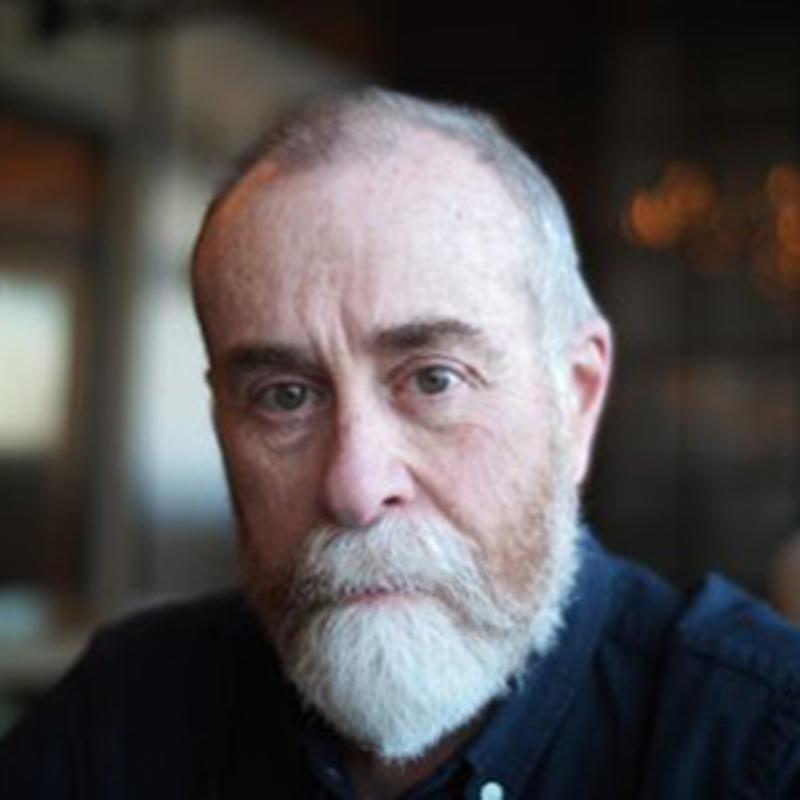
The program would offer free coverage of diabetes and contraceptive medication, and could be the first step in encompassing a much broader variety of drugs
Author of the article: Hiren Mansukhani
Published Feb 27, 2024 •
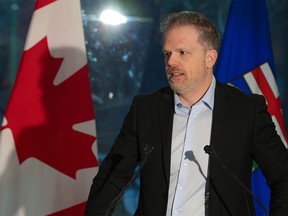
Article content
Alberta is “jumping the gun” by vowing to opt out of a proposed national pharmacare program before knowing the details, a federal minister said Tuesday.
“For provinces to say whether or not they’re going to participate in something when they don’t even know what it is, is a little premature,” Health Minister Mark Holland told media following a cabinet meeting Tuesday.
The program would offer free coverage of diabetes and contraceptive medication, and could be the first step in encompassing a much broader variety of drugs. The legislation, part of a supply-and-confidence agreement between the Liberals and NDP, is scheduled to be tabled in parliament by March 1.
Alberta Health Minister Adriana LaGrange said Monday that the province will opt out of the program if it is passed due to a lack of consultation by the federal government and questions about costs.
She also said despite her positive relationship with Holland, she wasn’t informed of the plan. “We continue to text and speak to each other on a regular basis — I was quite surprised that I had no contact prior to this pharmacare program coming forward,” LaGrange said during a news conference Monday.
Holland told reporters on Tuesday that he heard from the provincial ministers about their concerns while co-ordinating with the NDP in crafting the plan and added he’ll engage with his provincial counterparts after the details of the deal are officially announced.
LaGrange on Tuesday stressed that health care falls under provincial jurisdiction, and the federal program would add additional layers of bureaucracy to a slate of existing subsidies.
“All we need is the federal government to provide those dollars to us and we will make sure that we enhance the programs, because we do have . . . a very robust pharmacare program here in Alberta,” LaGrange said in an unrelated news conference Tuesday.
On Monday, LaGrange called the plan “a hastily arranged, politically motivated program.”
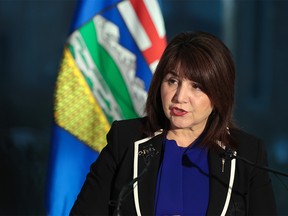
Christopher Aoun, press secretary for the federal Ministry of Health, told Postmedia in an emailed statement that “Our government has been working hard on pharmacare, including advancing a national strategy for rare diseases to improve access to new and emerging drugs.”
‘Absurd to play politics’: advocates
Alberta’s announcement has drawn criticism from advocacy groups and medical associations across the province. The Edmonton Zone Medical Staff Association stated that its members were “outraged” by the provincial announcement.
“It is absurd to play politics with the health of our patients and deny Albertans this groundbreaking program,” the statement read.
The statement said access to contraceptive drugs is prohibitive despite Alberta government claims to the contrary.
For instance, 16.8 per cent of Albertan women, whose median income is $36,900, do not have a government, employer or association insurance plan, and struggle to buy birth control and menstrual products when their household earns less than $40,000 per year.

The association also said Alberta’s two major subsidy programs — Alberta Adult Health Benefit and Alberta Child Health Benefit — for low-income prescription drugs are insufficient. They require a maximum income of $16,580 for a single adult household to $46,932 for a couple with four children to be eligible.
Chris Gallaway, executive director of Friends of Medicare — a non-profit supporting a universal public health system — said that by dismissing the federal program, Alberta is “playing politics.”
“They are siding with the profits of big pharmaceutical and insurance corporations over the health and well-being of Albertans,” said Gallaway.

Chambers of Commerce say plan could benefit economy
Support for Ottawa’s plan also came from the Calgary and Edmonton Chambers of Commerce, which issued a joint statement asking the province to discuss the viability of the federal plan in Alberta.
“With the ongoing labour shortage and need to attract talent, and the cost to employers for providing health-related benefits along with the financial benefit of pooling resources across provinces, a national pharmacare program, if developed well, could benefit Alberta’s economy,” the statement read.
“While more details are required to better understand the implications and potential benefits of a national program, we encourage the Alberta government to evaluate its feasibility and work with the federal government to explore whether it meets the needs of Albertans.”
